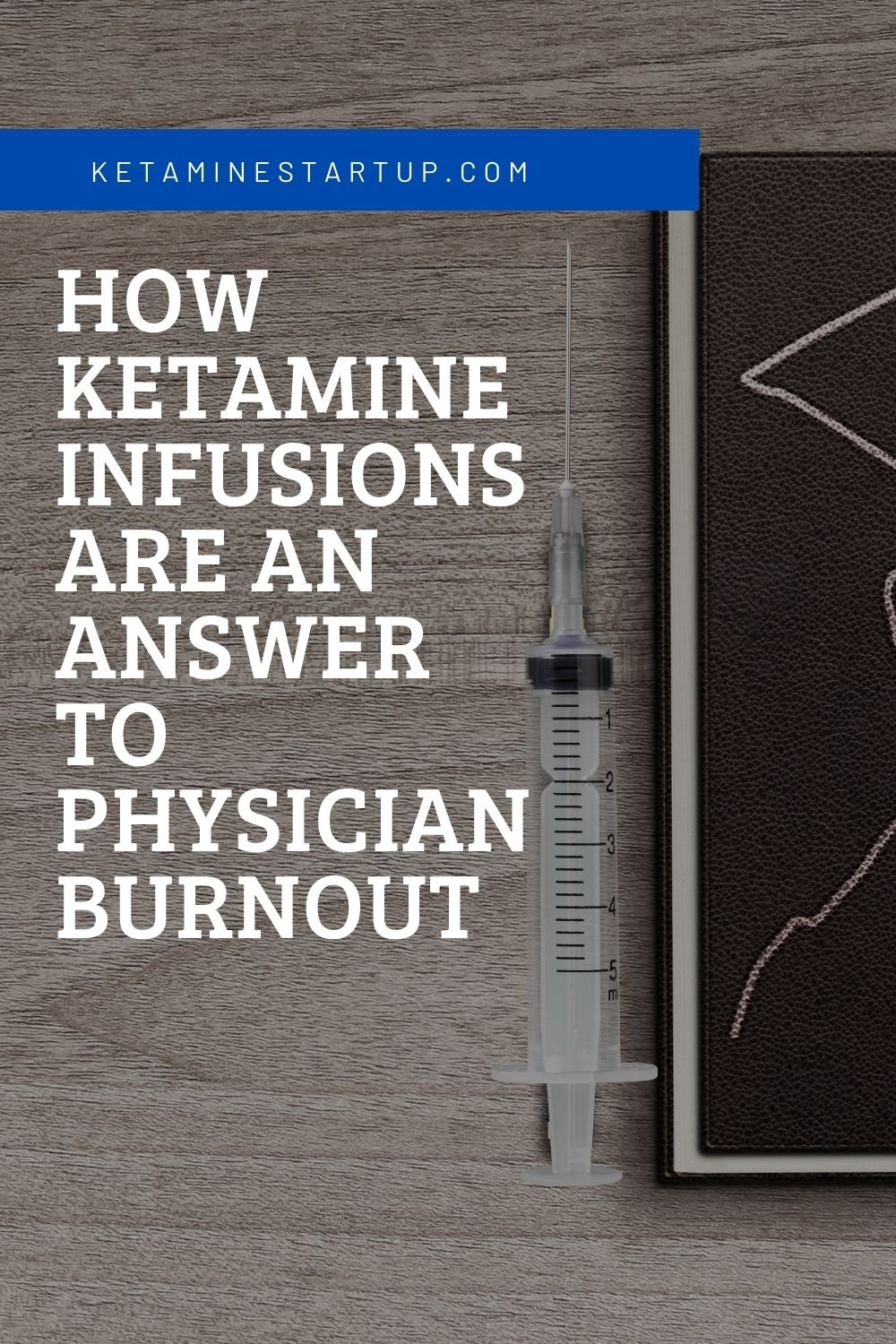How Ketamine Infusions Are An Answer To Physician Burnout
Let’s face it, we physicians are as human as the patients we treat. We also get burned out and experience depression and anxiety. We also need treatment or sometimes, even just a new environment. In this blog post, we talk about why ketamine infusions can be the answer to physician burnout. And this just doesn’t necessarily mean receiving ketamine treatment, but maybe even starting your own ketamine infusion clinic as well.
The number of physicians experiencing burnout and depression are slowly increasing.
Physician Burnout: A Sad Reality
According to the Agency for Healthcare Research and Quality, burnout is “a long-term stress reaction marked by emotional exhaustion, depersonalization, and a lack of sense of personal accomplishment.”
In fact, multiple studies have suggested that a large number of physicians are experiencing burnout, and this number is slowly increasing. Some interventions have been taken to address clinical burnout such as implementing flex schedules, staff surveys and work home balance. And yes, these interventions are well-intentioned, but can be impractical when put into practice especially with the patient volume, administrative demands, and lack of buy-in by fellow colleagues.
What’s more alarming is that burnout isn’t always burnout, but may even be depression. Because the symptoms are so similar, depression can sometimes be mistaken as burnout. That is why you should take extra steps to diagnose yourself properly. A long vacation or time off can alleviate burnout, but not depression.
Due to the COVID-19 pandemic, more and more physicians are suffering from mental illnesses. Sadly, many are left untreated.
The Realities of Physician Burnout Amidst the COVID-19 Pandemic
Another sad reality is that due to the COVID-19 pandemic, more and more physicians are experiencing a decline in mental health. For countries such as China and Italy where COVID-19 was most prevalent, a study showed that among the physicians that surveyed, 46% of them reported mild-to-severe depression symptoms, 41% reported mild-to-severe anxiety symptoms, and 67% reported mild-to-severe post-traumatic stress symptoms.
As of this writing, there is no specific data yet available on the suicide rates of physicians due to the pandemic, however it is clear that the number of physicians experiencing depression and anxiety are increasing.
To top it all off, many physicians endure their mental illnesses in silence and don’t seek treatment in fear of professional consequences. According to a study, many medical professionals and students are afraid that disclosing that they have a mental condition will affect their professional advancement. Additionally, a 2007 study found that “more than one-third of state medical licensing board executive directors believed that a mental health diagnosis alone was sufficient to impose sanctions on health care providers.”
An effective treatment, such as ketamine, is needed to address the growing number of physicians experiencing burnout.
Ketamine Infusions: The Answer to Physician Burnout
It’s no surprise why the number of physicians experiencing burnout is increasing. We physicians need to take care of ourselves as much as we take care of our patients. An effective solution is needed if we want to address the harsh realities many physicians are facing.
Various studies have found that ketamine has a significant role to play in reducing suicidal ideation (or suicidal thoughts). In fact, one study found that thoughts of suicide have significantly decreased within 40 minutes of an IV ketamine infusion, and remained decreased 4 hours after. Another study found that repeated infusions extended the decrease in thoughts of suicide up to 3 months in some patients diagnosed with treatment-resistant depression.
How does ketamine work exactly? Well, no one knows the specific answer to that. But we believe that how ketamine treats depression is multifaceted. In one way, ketamine enhances neuroplasticity by increasing Brain Derived Neurotrophic Factor (BDNF) levels. This literally changes our brain and resets it back to a healthier state.
Ketamine also affects us on a psychological level through its dissociative properties. This allows us to experience our unconscious mind and make sense of any past traumatic memories or negative emotions. Lastly, we believe that ketamine changes us spiritually by connecting us to God or the universe, leaving us with a sense of relief and peace.
Physicians, just like any other human being, can experience depression, anxiety and chronic pain. And ketamine could be the solution to this problem.
For physicians dealing with burnout, a possible solution is a change in career, such as starting a ketamine clinic.
Ketamine Infusion Clinics: A Possible Career Shift for Burned Out Physicians
Many physicians, like ourselves, have chosen to leave the hospital scene after dealing with burnout. In fact, last year, a phenomenon called “The Great Resignation” shows that the healthcare industry was hugely impacted by this. And this isn’t just because of the pandemic, but many healthcare workers have chosen to leave their jobs because of the current hospital system as well.
Those who resign from their hospital jobs are looking into starting a private practice. In our case, we chose to start a ketamine infusion clinic. And this is why we’re encouraging many of our fellow physicians to take this path too.
Read our blog Should You Start a Ketamine Clinic or Continue Working In the Hospital? to help you gain more clarity on your current situation!
As a ketamine infusion clinic owner, you don't have to deal with all the administrative burdens in a hospital, and you get to call the shots. You can decide which patients you want to see, how you want to treat your patients, and how you want to run your clinic.
But starting a ketamine clinic has its own unique challenges as well that you won’t have to face when working in the hospital. This includes hiring staff, marketing your clinic, and finding your own patients! So yes, running your own ketamine could be the answer to burnout in the hospital, but you need to look inward first to see if this is what you truly need and want.
Do you have all the right reasons to start your own ketamine infusion clinic? Read our blog post 5 Reasons Why You Should Open A Ketamine Clinic to find out!
Despite the availability of solutions to address physician burnout and depression, change must still be made in the healthcare system for future generations.
Ketamine Alone Isn’t Going to Fix Burnout
Although ketamine infusions could be a solution to burnout for many physicians, it’s still not enough. Radical change is needed also in the healthcare system and medical education is required to decrease the number of burned out physicians. There must be a change in work culture and the medical space should be more understanding to professionals with mental illnesses.
And while radical change may not happen in the near future, physicians can take their own action today by taking care of themselves and practicing the way they want to. Sometimes, you just need to reclaim a sense of autonomy and power in your work environment. Sometimes, you just need to practice your profession the way you want to.
For those physicians who are considering ketamine infusion treatments, do remember that you shouldn’t rely on the infusions alone. Ketamine should be treated as a catalyst instead. No medication alone will address the issue, but you also need to instill lifestyle changes and mindset shifts to get better. This is no different than what we recommend to our ketamine patients in our clinic.
But to answer your question, yes, ketamine infusions are an effective treatment, you just need to do your active part as well.
No matter how hopeless your situation may seem, there is always light at the end of the tunnel.
Summary: There Will Always Be Hope
If you’re reading this and feel hopeless and trapped in your current job, don’t lose hope. We also felt extremely tired of our situation, which is why we decided to take action and start a new life for ourselves. It was, without a doubt, no easy journey, but it was also, without a doubt, worth it. We’ve had our challenges when starting our ketamine clinic, but we never looked back from there.
Want to know the 5 truths about opening up a ketamine clinic? Read our blog here.
Remember that if you do plan on starting your own private practice, or get treated for a mental illness, you are not alone. Yes, there will be those who will discourage you, but that’s all part of the journey. Besides, who said anything worth pursuing was easy?
















Wondering when to leave your job and run your ketamine clinic full-time? Learn a simple 3-step framework to make a confident, informed decision.